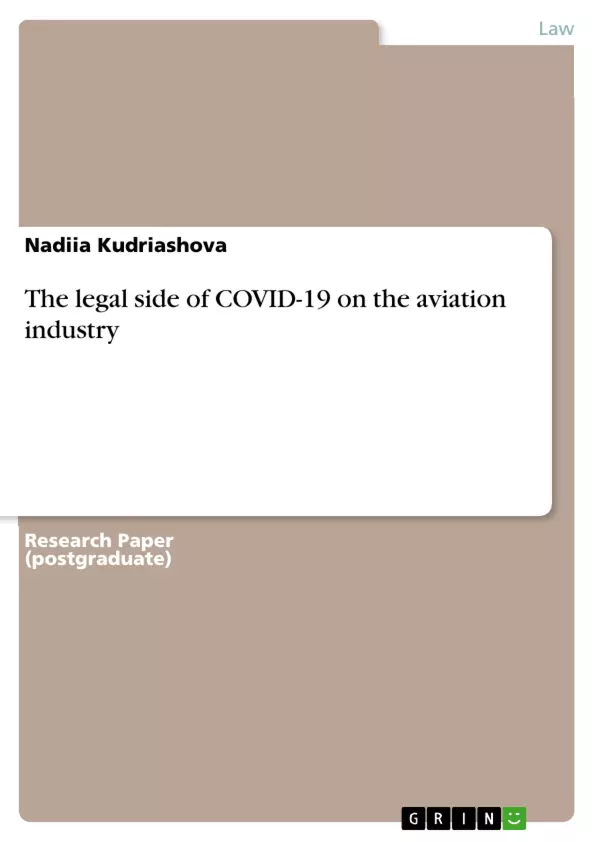In March of this year, the WHO and ICAO issued a joint statement containing updated recommendations on COVID-19 and civil aviation. This document reaffirms the commitment of these specialized UN agencies to expand international cooperation to curb the spread of the virus and protect the health of passengers. The statement notes the importance of States complying with ICAO and WHO standards related to the prevention of the spread of infectious diseases and the International Health Regulations (Reed para. 3-5). ICAO has issued two e-newsletters and one letter to member-states urging states-member to abide WHO recommendations and instructions. The ICAO letter to member states explicitly calls governments to implement the relevant provisions of Appendix 9 to the Convention on International Civil Aviation (Chicago Convention), apply for CAPSCA membership, increase funding for outbreak response and establish a national air traffic facilitation transportation committee. However, simplification of formalities does not mean restriction of the legal rights of passengers which in fact is introduced around the world.
Inhaltsverzeichnis (Table of Contents)
- Problem Identification
- Legal Implications
Zielsetzung und Themenschwerpunkte (Objectives and Key Themes)
This work examines the legal aspects of the COVID-19 pandemic's impact on the aviation industry. It analyzes how international regulations and agreements, particularly the Montreal Convention, address issues arising from travel restrictions, flight cancellations, and passenger rights.
- The legal framework surrounding international air travel
- The impact of COVID-19 on the aviation industry
- The interplay between public health measures and individual rights
- The application of force majeure and extraordinary circumstances in aviation law
- The role of international organizations like ICAO and WHO in addressing the pandemic
Zusammenfassung der Kapitel (Chapter Summaries)
- Problem Identification: This chapter outlines the challenges faced by the aviation industry due to the COVID-19 pandemic. It highlights the financial losses incurred by airlines, the impact on global air travel, and the unprecedented nature of the situation. It also explores the role of international organizations like ICAO and WHO in coordinating responses.
- Legal Implications: This chapter focuses on the legal framework governing international air transport, particularly the Montreal Convention. It examines how the convention addresses issues related to flight cancellations, passenger rights, and compensation. It also discusses the balance between public health measures and individual rights.
Schlüsselwörter (Keywords)
The primary themes and concepts explored in this work include international air law, Montreal Convention, COVID-19, aviation industry, passenger rights, public health, force majeure, extraordinary circumstances, and travel restrictions. These key terms encapsulate the legal and practical challenges faced by the aviation industry in navigating the unprecedented circumstances of the pandemic.
Frequently Asked Questions
How did COVID-19 affect international aviation regulations?
The pandemic forced international bodies like ICAO and WHO to issue joint statements and urgent recommendations to curb the virus while attempting to maintain essential civil aviation standards.
What is the role of the Montreal Convention during flight cancellations?
The Montreal Convention provides the legal framework for passenger rights and compensation, though its application during a global pandemic involves complex debates over "extraordinary circumstances."
What is the Chicago Convention (Appendix 9) in this context?
ICAO urged member states to implement provisions of Appendix 9 related to air traffic facilitation and infectious disease prevention to streamline health formalities at borders.
Does "simplification of formalities" restrict passenger legal rights?
While health measures aim to simplify safety protocols, the work notes that this should not lead to a restriction of the fundamental legal rights of passengers.
What is CAPSCA and why is it relevant?
CAPSCA is a global partnership to improve preparedness for public health outbreaks in aviation; states were urged to apply for membership during the COVID-19 crisis.
- Arbeit zitieren
- Nadiia Kudriashova (Autor:in), 2020, The legal side of COVID-19 on the aviation industry, München, GRIN Verlag, https://www.grin.com/document/903252



